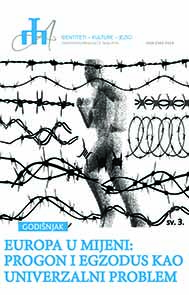Etika odgovornosti i etika uvjerenja medija u suvremenim procesima migracije stanovništva radi postizanja kulturne integracije
Ethics of Responsibility and Ethics of Media Conviction in Contemporary Migration Processes for the Purpose of Attaining Cultural Integration
Author(s): Ivana Sivrić, Silvana Marić TokićSubject(s): Media studies, Ethics / Practical Philosophy, Migration Studies
Published by: Filozofski fakultet Sveučilišta u Mostaru
Keywords: mass-media; contemporary migration processes; culture; integration; ethics of responsibility; media ethics; moral judgement;
Summary/Abstract: The media are a reflection of social reality. The significance and the role of media have changed throughout history. It is emphasized in theory that two phases of social thought and relationship towards media exist. The first phase represents the time period until the 1950’s. That phase is marked by the emergence and development of certain media such as the film, radio, telephone and many social changes and social determinism which operated in the direction of manufacturing, labour division, i.e. the development of economy as a dominant social trade. With further development of the society, science and technology comes a shift in understanding the economy as a basic social trade. The society is now turning toward a culture in which the media are an important socialization agent. This second phase is dominant even today. Special attention is given to the development of television which Marshall McLuhan calls “an extension of the human body”. Until then, more serious thinking about the theory of the media were given by the representatives of the Frankfurt School and V. Benjamin. McLuhan made a turning point in media comprehension with his thought that the media “have made the world a global village”. As the power and importance of mass-media became not only an unavoidable segment of human existence but also a culture of living, so emerged a need to define the responsibility, ethics and moral judgement of the role and doings of the media. We ask ourselves whether the emergence of new media has lowered the social importance and critical thinking of the public and led to alienation of man. The convergence of media is also changing and we do not perceive them just as means of information transmission anymore, but also as a factor which influences the society and which sets foundations to new values and principles which the contemporary man strives for. The contemporary processes of population migration are the dominant themes the media are employed with lately. We ask ourselves whether the media are more ethically convincing when they call for cultural and social integration of the migrants or are they responsible in their reports. Do the media serve as an extension of human thinking and acting or as guides and mediators of cultural reality in which the citizens have become passive participants of political, economic, social and migration processes and changes? Max Weber distinguishes two types of responsibility which he urges the media obey. He distinguishes between the ethics of responsibility and the ethics of conviction. Do the media judge correctly the integrity of work, notably according to foreseeable consequences or do they evaluate the integrity of work based on conviction are the key question that are dealt with in this paper.
Journal: Identiteti - Kulture - Jezici
- Issue Year: 3/2017
- Issue No: 1
- Page Range: 147-170
- Page Count: 24
- Language: Croatian

